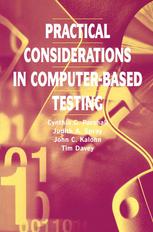

Most ebook files are in PDF format, so you can easily read them using various software such as Foxit Reader or directly on the Google Chrome browser.
Some ebook files are released by publishers in other formats such as .awz, .mobi, .epub, .fb2, etc. You may need to install specific software to read these formats on mobile/PC, such as Calibre.
Please read the tutorial at this link: https://ebookbell.com/faq
We offer FREE conversion to the popular formats you request; however, this may take some time. Therefore, right after payment, please email us, and we will try to provide the service as quickly as possible.
For some exceptional file formats or broken links (if any), please refrain from opening any disputes. Instead, email us first, and we will try to assist within a maximum of 6 hours.
EbookBell Team

4.8
74 reviewsThis book introduces computer-based testing, addressing both nontechnical and technical considerations. The material is oriented toward practitioners and graduate students. The practical emphasis will be useful to measurement professionals who are or will be responsible for implementing a computerized testing program. The instructional information is also designed to be suitable for a one-semester graduate course in computerized testing in an educational measurement or quantitative methods program. While certain theoretical concepts are addressed, the focus of the book is on the applied nature of computerized testing. For this reason, the materials include such features as example applications, figures, and plots to illustrate critical points in the discussions. A wide range ofnontechnical issues need to be considered in implementing a computer-based testing program. Separate chapters are provided on test administration and development issues, examinee issues, software issues, and innovative item types. Test administration and delivery issues include the location of exam administration, selection of hardware and software, security considerations, scheduling of administration frequency and time limits, cost implications, and program support as well as approaches for addressing reliability, validity, comparability, and data analysis. Examinee issues include the influence ofexaminees' reactions to adaptive testing, the effect ofcomputer based task constraints, and the impact of examinees' prior computer experience. Software issues include usability studies and software evaluation as tools in selecting and developing appropriate software, based on the test program needs.